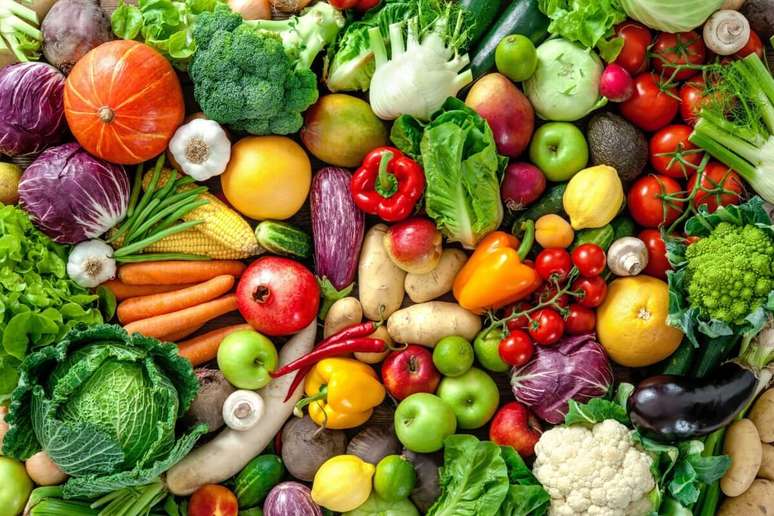Find out how they promote the functioning of the body and help prevent diseases
Vegetables are plant foods, generally consumed in the form of leaves, roots, fruits or stems. They are known for their richness in essential nutrients such as vitamins, minerals and fibre, which play an important role in the healthy functioning of the human body. This is because regular consumption of vegetables is essential for maintaining a balanced diet and providing the body with the nutrients needed for various functions and preventing chronic diseases.
Next, check out 8 vegetables and their health benefits!
1. Spinach
This green superfood is an excellent source of iron, which is essential for healthy red blood cells and the prevention of anemia. Plus, it’s rich in antioxidants like vitamin C and beta-carotene, which fight damage caused by free radicals, promoting healthy skin and a strong immune system.
“An organism with low immune defenses presents greater susceptibility to infections, difficulty recovering from diseases, increased risk of autoimmune diseases, worsening of chronic diseases and decreased quality of life,” says Dr. Jackeline Barbosa, vice president of medical- scientific University Herbarium, pharmaceutical industry.
2. Carrot
Known for their richness in beta-carotene, carrots are essential for eye health, helping maintain clear vision and protecting against age-related eye diseases. It is also an excellent source of fiberspromoting digestive health and helping to regulate blood sugar levels.
“Fibres give greater satiety and slow down gastric emptying. Therefore, the feeling of hunger takes a long time to appear and, consequently, can lead to less food intake,” says nutritionist Roberta Stella.
3. Broccoli
This vegetable is a nutritional powerhouse, rich in vitamin K, which plays an important role in blood clotting and bone health. Additionally, broccoli is a good source of folate, which is important for cellular health and the prevention of neural tube defects during pregnancy. Regular consumption can also contribute to cardiovascular health, thanks to its richness in potassium, which helps keep blood pressure under control.
4. Tomato
Tomatoes are an excellent source of lycopene, an antioxidant linked to reducing the risk of cardiovascular disease. They are also rich in C vitaminwhich “acts directly on our defense cells and helps fight pathogenic microorganisms, strengthening our antibodies”, says pharmacist Luciana Rocha.

5. Pepper
Rich in vitamin C, bell peppers not only strengthen the immune system but also aid in the absorption of iron from plant sources such as spinach. Plus, they’re a great source of vitamin Aessential for healthy skin and vision.
6. Pumpkin
Rich in fiber and low in calories, pumpkin is an excellent choice for those who want to maintain a healthy weight and regulate blood sugar levels. Additionally, it is an excellent source of vitamin A, which promotes eye and skin health. skin.
7. Cauliflower
This versatile vegetable is an excellent source of vitamin C and folic acid, which play a key role in the production of healthy blood cells. Additionally, cauliflower is rich in antioxidants that may help reduce the risk of chronic diseases.
“The cells of our body are constantly subject to toxic damage due to the formation of free radicals, which come from reactions that take place in the cell membrane and are responsible for the onset of various diseases and degenerative processes in the human body”, explains cardiologist Bruno Ganem .
8. Garlic
In addition to adding flavor to dishes, garlic is known for its powerful health benefits. Rich in sulfur compounds, such as allicin, it has antibacterial and antifungal properties, helping to strengthen the immune system and fight infections. Furthermore, it helps reduce the cholesterol and blood pressure, promoting cardiovascular health.
“Quality nutrition goes beyond culinary or aesthetic pleasure. It is a factor that has a gigantic impact on the health of the human body. It is not surprising that the vast majority of treatments aimed at reducing LDL (bad cholesterol) are intrinsically linked to a balanced nutritional program,” emphasizes Dr. Julia Machline Carrion, head of medical affairs at epHealth.
Source: Terra
Ben Stock is a lifestyle journalist and author at Gossipify. He writes about topics such as health, wellness, travel, food and home decor. He provides practical advice and inspiration to improve well-being, keeps readers up to date with latest lifestyle news and trends, known for his engaging writing style, in-depth analysis and unique perspectives.








